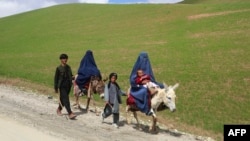A new United Nations report suggested Thursday that the hardline Taliban government in Afghanistan has eased its drive to enforce an Islamic dress code or hijab on women.
However, the U.N. Assistance Mission in Afghanistan, or UNAMA, noted in its quarterly report that violations of human rights at large continued under the Taliban regime.
The Taliban have mandated that Afghan women wear what is termed as the “sharia hijab” in public, covering their faces entirely or only showing their eyes. The operations to enforce the dress code are carried out by the group’s Ministry for the Propagation of Virtue and the Prevention of Vice.
While UNAMA continued to receive reports of the enforcement of the hijab instruction by the Taliban ministry, the report said that “such incidents significantly decreased after January 2024 with the cessation of the large-scale enforcement actions which took place between December 2023 and January 2024.”
On January 11, the UNAMA raised the alarm over numerous cases of girls and women across Afghanistan, some held incommunicado, being detained, and others reportedly ill-treated for alleged non-compliance with the hijab. Taliban authorities at the time dismissed U.N. concerns as “incorrect” and “propaganda.”
Thursday’s UNAMA report noted that the new school year in Afghanistan commenced without the presence of girls in high schools due to the Taliban’s continued ban on girls’ education beyond grade six.
“An invitation to attend a ceremony in Kabul marking the commencement of the new academic year, issued to media by the de facto Ministry of Education, specifically instructed women journalists not to attend, citing a “lack of proper place[s]” for women,” the report said.
The UNAMA reported that journalists and media workers continue to operate in a challenging environment in Afghanistan, with the media facing a range of restrictions imposed by the Taliban and the risk of arbitrary detention in the course of their work.
Taliban authorities carried out three public executions of individuals sentenced to death on murder charges, the report said. Since the Taliban seized power in August 2021, they have publicly executed five murder convicts despite U.N. calls for halting the practice.
“The de facto authorities also continue to implement judicial corporal punishment in public, with such punishments taking place in at least one province each week,” the UNAMA said.
The Taliban have publicly flogged hundreds of men and women in sports stadiums in the presence of thousands of onlookers. The victims were convicted of offenses such as theft, robbery, adultery, and other “moral crimes” by Taliban courts.
Afghan women have also been barred from many public and private workplaces, including the United Nations.
Taliban supreme leader Hibatullah Akhundzada has defended his governance, saying it is strictly in line with local culture and Islamic law. He has dismissed international criticism of his policies and strict interpretation of Islamic law as an interference in Afghanistan’s domestic affairs.
The international community has refused to recognize the Taliban government primarily over its harsh treatment of Afghan women.




